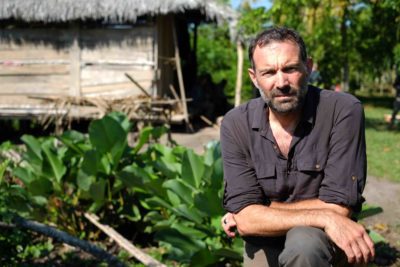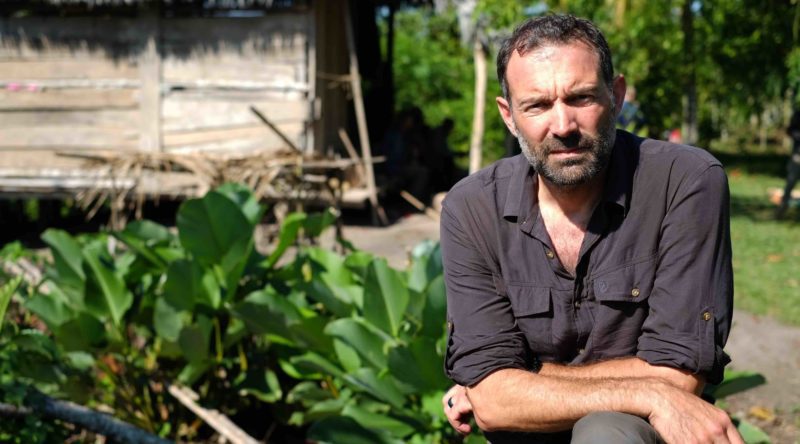INTERVIEW: Adventure cameraman steps in front of the camera on ‘Expedition Mungo’

Expedition Mungo, the new Animal Planet series, follows an adventure cameraman who stops looking through the viewfinder of his camera and instead decides to step in front of the scrutinizing lens and become a reality star.
Paul Mungeam, aka Mungo, has created a six-part series that finds him traveling around the world looking for mythological creatures that hold sway in locals’ hearts. Week by week, he travels to a new destination and unearths details on the legends of these seemingly far-fetched tales of yore.
On Expedition Mungo, which continues with new episodes Sundays at 10 p.m., Mungo heads to the wilds of Peru, Argentina, India, Borneo, Namibia and Liberia. “We certainly get around the world,” Mungo said in a recent phone interview. “I go and investigate stories that I’ve heard throughout my career where animals, so-called mythological creatures have had conflict with humans and quite often attacked people and sometimes killed people, so we go in and kind of track them down. So I think the series is about extreme travel. It’s about expedition. It’s about adventure and challenge, but also there’s a very serious side to it as well. We try and work out whether the so-called mythological creatures are fact or fiction, and we try to prove it with some of our camera technology.”
The stories that Mungo explores have existed in local folklore for quit some time. There’s one about an unidentified dragon-like reptile that terrorizes a village in Borneo and another one about a shape-shifting creature in the Namibian savanna.
“Quite often, when I’ve been shooting somebody, you’ll hear people say, ‘You should have been here three years ago because this was going on in this place or this region,'” he said. “Some of them are quite far-fetched, so obviously from a western education point of view, where you’re taught logic, you do kind of think, I have a lot of skepticism about the dog-headed pig monster or whatever it might be because it sounds ridiculous. But, on the other hand, that’s probably my head, but my heart, who likes to champion the underdog, often makes me think, whether it was a mythological creature or some other creature, this story has obviously affected someone’s life quite extensively. So, I think, they, out of respect, deserve their story to be told.”
On each of the six episodes, Mungo and his team are unable to find those ultimate payoffs, which should come as no surprise to audience members. If he actually found evidence of a massive, dinosaur-sized lizard in Liberia, the news media would have been on the scene already. However, Expedition Mungo certainly captures some evidence and make some startling revelations. “I can say, hand on heart, that we do get results, so for those who are skeptical, keep watching,” he said.
This love of the unknowns in the world goes back to when Mungo was a child. “I’ve always had a fascination with the world and travel definitely since I was a kid,” he said. “My dad was a businessman who traveled the world, so I was able to go on a few trips with him. So very early on in my life, I kind of knew the world was a smaller place than you think.”
Expedition Mungo joins a crowded marketplace of adventure/expedition shows that find hosts traveling to the far reaches of the globe in search of the unknown. No one knows this fact better than Mungo himself. After all, he was a cameraman for the likes of Bear Grylls and has also worked with celebrities like Will Ferrell, Ben Stiller, Simon Cowell and Kate Winslet.
“I’ve been in the industry for over 20 years, so I understand that the market, to a degree, is saturated,” he said. “But my view is, I’ve worked with many hosts of shows over the years, hundreds probably, over 20 years, and I’ve definitely learned the best way to come across on TV is not to try and stand out but to just be 100 percent yourself. And I swear on my mom’s life that what you see is what you get. The Mungo you see on screen is the same as he is off, and we’re definitely not trying to reinvent the wheel.”
Moving from Borneo to Peru to India on one season can prove difficult. The environmental elements are drastically different, and this means the challenges are new each and every week.
“There are technical issues, such as humidity and extreme heat, but also the cold in some places, which surprised us how cold it got at times,” he said. “Every challenge is out there in each place, but one of the attractions to me [as] an adventure cameraman was the uncontrolled environment. That’s kind of what makes me get up in the morning and go out to work. I love it. I mean, some cameramen choose the studio where they can read their paper and have their coffee … but, for me, I loved the uncontrolled environment because it’s just so exciting. And over the years, I’ve developed quite a high adrenaline threshold, so the more uncontrolled, the more risky it is, the more unknown it is, the more I’m interested.”
He added: “I counted it as a bit of a professional risk to step out from behind the camera because some presenters might think, oh, he’s going to try and step into my market. I don’t want to be perceived as being a professional threat, and I think when it came out, when it was edited and put together finally, the end product could only have ended one of three ways. #1 it could have been, oh, no, it’s terrible. I wish I’d never done it. #2 could have been, it’s OK, but it could have been better, or #3 could be, wow, I’m really proud of that. And fortunately it’s #3. I’m incredibly proud of it from a professional point of view, from a personal point of view, and my view is if you like it, great. If you don’t like it, find another channel.”
By John Soltes / Publisher / John@HollywoodSoapbox.com
Expedition Mungo continues on Animal Planet Sundays at 10 p.m. Click here for more information.

